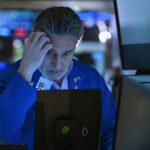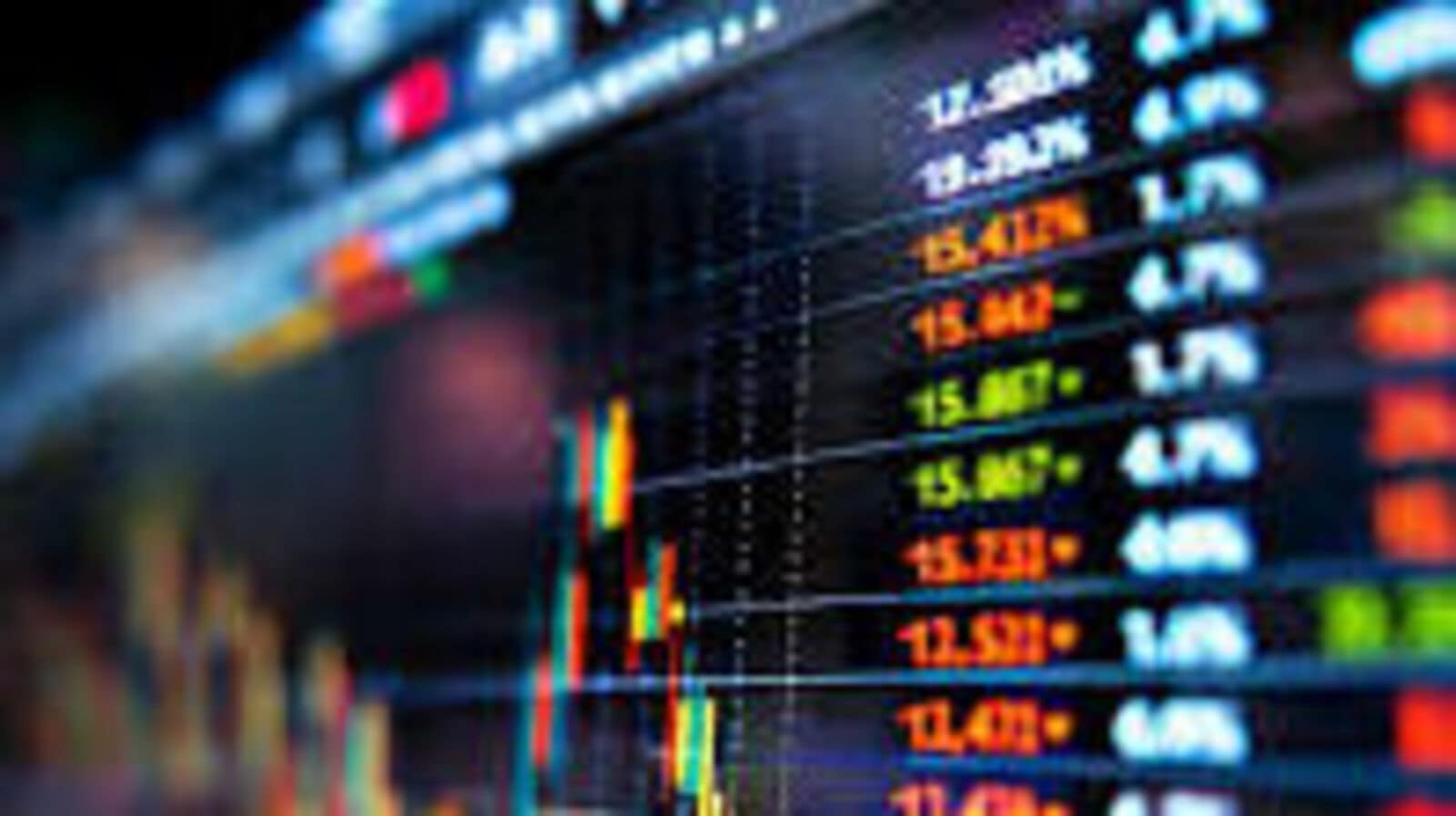QUOTES-Markets extend plunge after Powell says Fed to wait and see on tariffs impact

(Repeats to fix headline format. No changes to text)
The rout on Wall Street continued on Friday, with the Nasdaq earning a bear-market classification, after China imposed fresh tariffs on all U.S. goods in response to the Trump administration’s sweeping levies, escalating a global trade war.
The S&P 500, Dow and Nasdaq closed down more than 5% each. Losses accelerate after Federal Reserve chair
President Donald Trump’s new tariffs are “larger than expected” and the economic fallout including higher inflation and slower growth likely will be as well, pointing to potentially difficult decisions eventually for the central bank.
The global stocks selloff sent money flooding into low-risk assets like U.S. government bonds, even as safe-haven gold recoiled from Thursday’s record high alongside a further slide in crude oil brought by fears that a trade war would cause a global recession.
U.S. Treasury yields fell sharply on Friday after
against Trump’s tariff plan that caught markets off guard by its scope, although declines were curtailed after a
DAVID SEIF, CHIEF ECONOMIST FOR DEVELOPED MARKETS AT NOMURA IN NEW YORK
“The market is still digesting the great deal of uncertainty and I think it’s also digesting the fact that both Trump and Powell have made it clear that the cavalry is not coming to immediately cause things to bounce back up.”
“We’re a long way from a Trump put. Let’s leave it at that. And we’re also pretty far from a Fed put, although a Trump put would be much more powerful, of course, because Trump can actually take off the tariffs. All that the Fed can do is cut rates, which is not a panacea for what’s for what’s going on.”
MIKE MAYO, BANK ANALYST, WELLS FARGO, NEW YORK
“I think this market selloff is a new chance for the banks to show how resilient they have become in terms of capital, liquidity and derisking since the financial crisis. They have already showed the resilience after the Silicon Valley Bank failure and during the pandemic. Now these tariffs are unprecedented, and it’s hard to know the complete picture, due to retaliations and a wide range of things that can happen.
We can expect banks to increase their reserves for loan losses due to the higher recession risk. Also the volume of reserves will be higher because now they need to account for potential losses during the lifetime of the loan, which is higher than the short term potential losses.
“We are also seeing a paralysis among people that make decisions until there is more clarity, so that will surely impact investment banking revenue, advisory and capital markets revenue probably will fall.
“Having seen multiple crisis, so far I do not see signs of big stress due the market selloff. But considering its magnitude, there is a yellow light and we should be attentive. In the financial crisis is took years of leverage and excessive mortgage lending. Now it is different, it’s a deliberate decision to have short term pain for a long term gain. The question is, how much short term pain can you tolerate? That is not clear.”
JEFF O’CONNOR, HEAD OF MARKET STRUCTURE, LIQUIDNET, SUMMIT, NJ
“Tariff uncertainty is likely to rattle markets for the foreseeable future. Key economic indicators and market sentiment are pointing to concerns around stagflation and recession. Where in previous years more predictable data has given the market greater clarity over the likelihood of recession or inflation, the nature of tariffs – their unpredictability and deep impacts on supply chains – are keeping participants on edge.
“From an institutional perspective, participation and volumes are down significantly – particularly compared to last year, where conditions were near-perfect for traditional managers. While these conditions persist, it is unlikely that the market will return to its former health in the near future. All eyes will be on the impact of tariffs and the subsequent jobs, manufacturing and inflation data to gauge the extent of the malaise and for signs of whether the fog will lift.”
MICHAEL ROSEN, CHIEF INVESTMENT OFFICER, ANGELES INVESTMENTS , SANTA MONICA, CALIFORNIA
“The whole notion of tariffs and trade policy has been such an integral part of Donald Trump’s psyche, I don’t see it abandoned. He will have comments to say maybe he’ll moderate his positions, but I just think that fundamentally he is a strong believer in tariffs.”
“There’s some technical support around 5,000 on the S&P, wouldn’t surprise me to see that tested and then we’ll see where it goes. But that a $4 will get you coffee at Starbucks. This is a reaction to a bad, incoherent trade policy that will have nothing but negative implication for our economy and the world economy. So markets are adjusting to that and selling off. What it means is slower economic growth, risks of recession and elevated inflation.”
BRIAN BETHUNE, ECONOMIST, BOSTON COLLEGE, NEWTON MASSACHUSETTS
“If the tariffs were going into effect further out you’d at least have some chance of the businesses being able to reset their plans. That whole business planning process has been thrown into disarray. The market is saying, there’s no way that will change, even as flexible and resilient as US business is. You’re putting so many sandbags on the balloon, it’s going to come back down to earth with a thud.”
JOE RINALDI, PRESIDENT AND CHIEF INVESTMENT OFFICER, QUANTUM FINANCIAL ADVISORS, ROCKVILLE MD
“Powell’s position is very middle of the road, benign. However, I think they’re not going to have a choice but to reduce rates at least once before the end of the summer, because the global economies will continue to slow, right? It’s not going to happen immediately, but you’ll see it in, most likely, June’s numbers and July’s numbers that we are contracting. And I’m assuming that these tariffs stay in place for several months. Now, if one, or two, or three major trading partners – Taiwan, Japan – do an about face and say, ‘here’s the white flag, I surrender. What do you want?’ I think you’ll see this market turn around in a day. So, I don’t think it’s wise to be liquidating positions at this (time,) I mean, unless you have to, and you have the margin call.”
BENJAMIN FORD, G10 FX STRATEGIST, MACRO HIVE, LONDON
“There’s only been a handful of time when risk aversion has gotten worse than it currently is – one was during the great financial crisis, the other was during Covid.”
“Not all countries are going to retaliate – we know Europe had something in the pipeline, but they haven’t moved on that at all. What they might do is some package to support the wider economy. Long term, it really is going to come down to who retaliates and who just looks to support their economy.”
“Latin America is the most attractive place to invest right now – both in how cheap equities are, and from a bond perspective (investors) can pick up incredible rate differentials.”
CAROL SCHLEIF, CHIEF MARKET STRATEGIST, BMO PRIVATE WEALTH, MINNEAPOLIS, MINNESOTA
“The follow through with today’s big push down is truly a lack of buyers. Folks have moved to the sidelines to see how the initial negotiations / retaliation goes – and don’t know how to assess how far down is “enough”
“No one wants to increase long positions going into this weekend with more tariffs kicking in and the potential for more headlines over the weekend. Better to hold off and wait until Monday once everyone’s had a chance to cool down and reassess.”
KEVIN PHILIP, PARTNER, BEL AIR INVESTMENT ADVISORS, LOS ANGELES
“Whenever selloffs are these violent it increases the likelihood of structural issues that could be cascading events, but I don’t see it yet .. leveraged positions were generally trimmed prior to this”
“I am focused on what I think is a game of chicken that Trump is playing, I think there’s a lot of showmanship to this, as we saw with Vietnam this morning … I think we’re going to see a parade of phone calls and visitors to the White House”
“I don’t think (Trump) is going to be highly tolerant of massive stock market declines – he’ll see his popularity tank, and it will endanger his whole agenda”
“If he had no intention of negotiating, tariffs would be a complete disaster for the low- and middle-income people of this country – many have voted for him. There would be a shortage of goods, high inflation … that’s why this market is readjusting like this”
“I don’t see any way out of this if he doesn’t come up with deals or reasons to change course”
PETER CARDILLO, CHIEF MARKET ECONOMIST, SPARTAN CAPITAL SECURITIES, NEW YORK
“(Federal Reserve Chair Jerome Powell) is really not saying anything new. He’s saying that the incoming data are still solid, and the labor market is in balance.”
“And of course, there’s greater risk now we have more clarity on tariffs. But he also mentioned that the inflation tariff inflation should be temporary. He hasn’t really changed his position.”
“I think his comments will be disappointing for those who believe that the Fed is going to step in anytime soon.”
GENE GOLDMAN, CHIEF INVESTMENT OFFICER AT CETERA INVESTMENT MANAGEMENT, EL SEGUNDO, CA
“He said that the effects of tariffs would be larger than expected. He also alludes to the fact that inflation will be less transitory. Really he’s worried about inflation.”
“This suggests that the Fed won’t cut rates as much as the market had hoped. Reading between the lines he’s saying that if the economy slows he’ll let it slow because he’s more worried about inflation at this point. The market is adjusting to this.”
CHRIS SCICLUNA, HEAD OF ECONOMIC RESEARCH, DAIWA CAPITAL MARKETS, LONDON
“We have a massive destruction on wealth going on in markets, with the exception of fixed income — which is having a massive rally. Lower bond yields and flatter yield curves are not what banks want to be seeing. Policy normalisation in Japan is looking less likely and that’s an unfavourable environment for banks. Elsewhere, rate-cut expectations are growing.”
KYLE RODDA, SENIOR FINANCIAL MARKET ANALYST, CAPITAL.COM, MELBOURNE
“I think there’s the concern that the trade war has killed Japanese reflation – so in short, it’s an expression of the slowdown in Japan’s economy expected to come about because of tariffs. Japanese yields have tumbled and the curve has flattened quite a bit, hurting the prospect for bank profits. Add the stronger currency in the air and you have a very negative mix for bank stocks.”
FRED NEUMANN, CHIEF ASIA ECONOMIST, HSBC, HONG KONG
“The world has changed, and few economies reverberate these changes as strongly as in Japan. A weaker dollar, and threats of a global trade recession, put a real dent into Japan’s reflation prospects. As expectations of BOJ rate hikes are pushed out by the market, rates and equity markets inevitably respond to a new reality.
“The hurdle for rate hikes by Japan’s central bank have certainly risen on the back of tariff hikes by the U.S. However, the BOJ should not be counted out just yet, with lingering price pressures in Japan still keeping monetary officials in play.”
SEAN TAYLOR, CIO, MATTHEWS ASIA, HONG KONG
“The decline in Japanese banks is more to do with the fact they had done well on hopes of BOJ hiking rates to 1% over the next 12 months – so two more hikes. But the decline in the U.S. 10-year and rate expectations recently makes the market worry it’s harder to raise those rates now, so Japanese banks are factoring in no rate hike.”
MICHAEL MAKDAD, SENIOR EQUITY ANALYST, MORNINGSTAR, SINGAPORE
“There is a bit of a binary scenario: either U.S. tariffs stay as announced, or the reality turns out to be not so extreme. In the former scenario, Japanese bank shares are not currently undervalued, as we could easily have an economic recession in Japan in that case, and no further rate hikes from the BOJ.”
JON WITHAAR, SENIOR PORTFOLIO MANAGER, PICTET ASSET MANAGEMENT, SINGAPORE
“Banks in Japan are caught in the crossfire of waning rate hike expectations coinciding with the market coming to terms with increased chances of a global recession. Positioning across the market was quite long post the rash of regional bank consolidations we saw last month and sentiment was bullish, however this clearly has reversed very quickly.
“A key trade from here from our perspective is real estate and construction – both sectors have no direct tariff exposure, are seeing strong underlying conditions and benefit from rates being lower for longer. Many names across both sectors are improving shareholder returns, buying back stock and improving capital efficiency which is a theme that we like.” (Reporting by the Global Finance & Markets Breaking News team; Compiled by Alden Bentley, Tom Hogue, Dhara Ranasinghe and Amanda Cooper)









